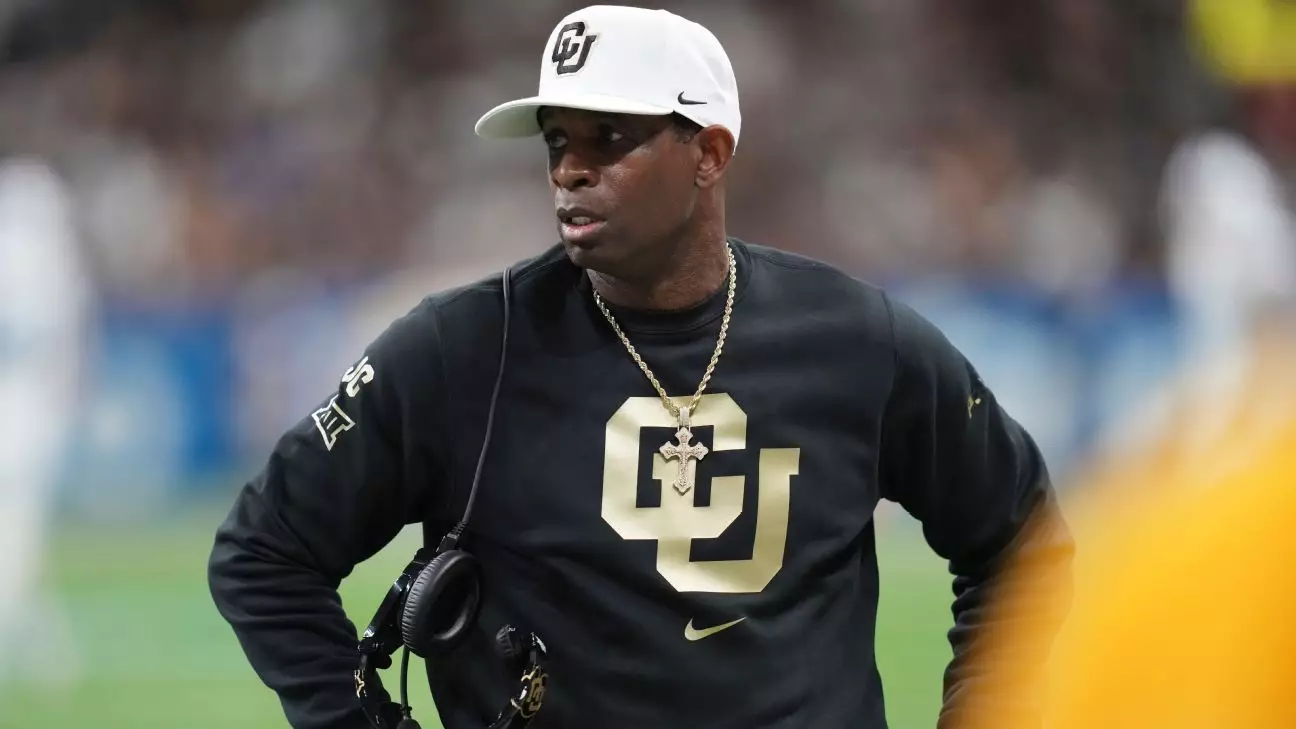In the dynamic realm of football, where legacy, strategy, and identity intertwine, Deion Sanders stands out not just for his prowess on the field but for his multifaceted role as a coach. Recently, he chose to remain at the University of Colorado despite overtures from the Dallas Cowboys for their head coaching vacancy. This decision is emblematic of a deeper conversation about the modern coaching landscape and Sanders‘ understanding of his unique position.
Sanders has transitioned from a celebrated player to a head coach, and his experiences offer critical insight into the evolving nature of football coaching. His reflections on the rigors of contemporary NFL practices highlight a significant tension between personal values and professional demands. During a candid discussion on his show „We Got Time Today“ with fellow Cowboys legend Troy Aikman, Sanders expressed his struggles with the current atmosphere of the NFL. He admitted, “I couldn’t coach pro ball,” and elaborated on the disparity between the intense environment he was accustomed to in the NFL during the ’90s and the current approach to training and practice.
Sanders’ aversion to the modern style of professional coaching illuminates a broader issue in sports: the evolving expectations of players and coaches alike. When Sanders played for the Cowboys, the intensity of training was significantly higher—reflecting a culture that rewarded grit and resilience. In contrast, he points out that the current NFL practices may not align with his coaching philosophy, which is grounded in the well-being of the players and an inherent respect for the game’s legacy.
This introspection aligns with his previous comments during a 2022 interview with „60 Minutes“ where he expressed lack of interest in NFL head coaching positions. With a coaching record of 13-12 at Colorado and a notable 9-4 season last year, Sanders has demonstrated a commitment to developing young talent in college football rather than attempting to navigate the often cutthroat and corporate nature of the NFL. His tenure at Colorado represents a conscious choice to invest in molding players, encapsulating a nurturing coaching approach rather than one focused solely on results or pressure from upper management.
The Cowboys’ choice to hire Brian Schottenheimer instead of pursuing Sanders may speak volumes about organizational dynamics in professional football. Aikman commented on Sanders’ potential impact as a head coach, suggesting that Sanders’ charisma and leadership would have made him an effective leader who could command respect in the locker room. The absence of an official interview for Sanders has left some former teammates disillusioned, signaling a disconnect between the traditional values of camaraderie and the modern-day realities of professional coaching selections.
Aikman’s candid remarks about the disheartenment of former teammates encapsulate the broader sentiment within the Cowboys community regarding sparks of change that could have been ignited under Sanders‘ leadership. Although the organization opted for in-house promotion, the missed opportunity of Sanders highlights a crucial conversation around leadership styles and the expectations of head coaches within such a storied franchise.
As the college football landscape continues to evolve, Sanders’ commitment to Colorado positions him as a potentially transformative figure in collegiate athletics. His focus on player development, combined with his unique understanding of the game, reflects a shift toward a coaching style that prioritizes foundations over immediate wins. The attention he receives is not merely a consequence of his celebrity status but rather an acknowledgment that authenticity and a genuine connection to the players can foster a thriving program.
While Sanders may have turned down the allure of the NFL’s limelight, he remains steadfast on a path where he can authentically influence the next generation of athletes. The decision to stay with Colorado reveals an understanding that sometimes the most profound impact occurs not in the spotlight of NFL glory but within the developmental corridors of college football, where lasting legacies are built—not just in victories, but through the people one mentors.
Ultimately, Deion Sanders‘ journey highlights the complexities of identity within coaching, urging a reconsideration of what it means to lead in sports. As he continues to navigate these waters, Sanders redefines success, demonstrating that true impact goes beyond wins and losses; it transcends to the relationships and legacies forged along the way.


Napsat komentář